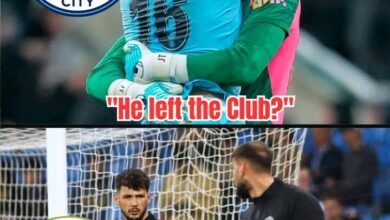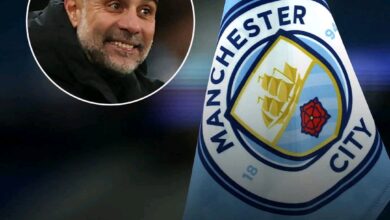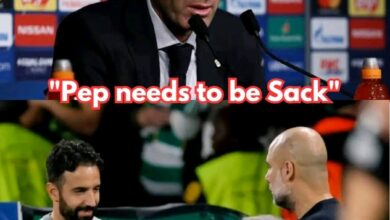Liverpool team news: Predicted XI vs Man Utd as Gakpo dropped and Ekitike benched

For Liverpool, Anfield has always been more than a stadium. It is a theatre of emotion, of histor, and of pressure — a place where generations of managers have either thrived or faltered under the unrelenting gaze of its crowd. As Arne Slot leads his Liverpool side into their first clash with Manchester United since taking over from Jürgen Klopp, he finds himself confronting an early test that could define his tenure. Three consecutive defeats before the international break — to Crystal Palace, Galatasaray, and Chelsea — have turned early optimism into uneasy introspection. Now, with the league champions needing to rediscover their identity, Manchester United’s visit arrives like a storm cloud rolling over the Mersey.
This fixture, always one of English football’s most charged encounters, rarely lacks drama. But this time, there’s a distinct edge. United, still rebuilding under their own uncertain stewardship, have begun to discover resilience away from home. They have left Anfield unbeaten in their last two visits since that extraordinary 7–0 humiliation in March 2023 — a result that remains burned into the collective memory of both clubs. Two years on, the dynamics have changed, the managers have changed, but the intensity has not.
Slot, whose appointment was hailed as a bold, forward-thinking move by Liverpool’s hierarchy, is now confronting the kind of turbulence that Klopp himself rarely faced in his early months. His side look transitional — technically capable, full of running, but lacking the cohesion that made Liverpool’s pressing game the envy of Europe. Against Manchester United, there is no room for hesitation.
When Arne Slot arrived from Feyenoord, he promised football “with energy, structure, and courage.” For much of pre-season and the early weeks of the campaign, that promise seemed tangible. Liverpool looked refreshed — a side intent on controlling possession, rotating fluidly across the front line, and pressing intelligently rather than relentlessly. Yet as autumn has settled over Merseyside, cracks have begun to show.
Slot’s system, a hybrid between Klopp’s high-intensity press and Pep Guardiola’s positional control, depends heavily on discipline in midfield and quick recovery transitions. Without the ball, Liverpool have appeared stretched. The full-backs push high, the double pivot is often isolated, and opponents have found space between the lines that would have horrified Klopp’s coaching staff a season earlier. The defeat at Selhurst Park was a warning; the one at Stamford Bridge was an alarm.
Three losses in a row is not a crisis in itself, but it is the context — the manner of the performances — that has unsettled supporters. Possession without penetration, sterile domination, and a worrying lack of ruthlessness in both boxes have left the reigning champions looking oddly vulnerable. Against Manchester United, those frailties could be exposed again if the balance isn’t corrected.
With Alisson still sidelined due to a lingering calf injury, 25-year-old Giorgi Mamardashvili will start his third consecutive league match. The Georgian, signed from Valencia in the summer, arrived with a reputation as one of Europe’s brightest young goalkeepers — agile, composed, and comfortable in possession. Yet adapting to Liverpool’s expectations is no small task. In his first two appearances, he conceded soft goals against Southampton and Chelsea, moments that betrayed both nerves and unfamiliarity with the defensive line in front of him.
At Anfield, against Manchester United’s direct runners and quick transitions, Mamardashvili’s distribution and composure will be under scrutiny. Slot’s insistence on building from the back requires a goalkeeper willing to take risks. The question is whether, under pressure from players like Marcus Rashford and Alejandro Garnacho, those risks can be controlled.
Still, the Dutch manager is expected to persist. Mamardashvili’s long-term potential is clear — and with Alisson not expected to return until November, the Georgian has a window to establish trust and rhythm. His performance could go a long way to determining Liverpool’s confidence on Saturday evening.
If Liverpool are to rebuild momentum, their back four must rediscover its chemistry. Conor Bradley is likely to start at right-back once more, preferred over Jeremie Frimpong for his defensive reliability. The Northern Irishman’s energy and aggression have impressed Slot, even as fatigue crept in before the break. Bradley’s task against United will be immense — containing Rashford’s diagonal runs while still offering width in attack.
At the heart of defence, Ibrahima Konaté and Virgil van Dijk remain Liverpool’s most reliable partnership. Yet even they have looked uncertain of late, particularly when defending transitions. Slot’s higher defensive line, designed to compress play and enable quicker recovery of possession, has left both centre-backs exposed. Against United, whose forwards thrive on breaking quickly into space, this tactical gamble could prove decisive.
The left-back position presents another decision point. Andy Robertson’s experience and leadership make him an obvious choice, but Slot is reportedly tempted to hand Milos Kerkez another start. The 21-year-old Hungarian, energetic and technically sharp, provides a more attacking outlet — a full-back who drives forward with intent rather than recycling possession. In a game where Liverpool may dominate territory, Kerkez’s overlapping runs could help unlock United’s low block.
If Kerkez starts, expect him to push high up the pitch when Liverpool build possession, allowing Florian Wirtz — the new German jewel in Slot’s crown — to drift inside and operate between the lines. That dynamic could shape much of Liverpool’s attacking rhythm.
For all their attacking talent, Liverpool’s real challenge lies in midfield. Ryan Gravenberch, often described as Slot’s most “complete” midfielder, has become the fulcrum of the new system. Tall, elegant, and composed under pressure, the Dutchman’s ability to dictate tempo has been invaluable. But his workload has been immense — 135 minutes for the Netherlands over the international break adds to an already heavy club schedule. Whether fatigue will blunt his edge emains to be seen.
Beside him, Alexis Mac Allister remains an enigma this season. The Argentine, who dazzled during his debut campaign under Klopp, has struggled to find consistency in Slot’s more structured approach. His recent brace for Argentina against Puerto Rico suggested a player rediscovering rhythm, but domestic form has been less convincing. Mac Allister himself acknowledged the issue in an interview: “The season hasn’t started in the best way for me. I know I can give more.”
Slot, to his credit, has backed the midfielder publicly. “He understands the game, he sees the spaces before others do,” the Dutchman remarked last week. “We just need him to feel free again.” That freedom may be tested against United, whose midfield — led by Casemiro and Bruno Fernandes — will seek to disrupt Liverpool’s flow.
The Gravenberch–Mac Allister pairing is technically gifted but lacks natural defensive bite. Slot may compensate by instructing Szoboszlai to drop deeper when Liverpool lose possession, creating a temporary midfield trio to stifle United’s counter-attacks. It’s a risk — but one he may have to take if he wants to maintain attacking fluency
No Liverpool team can function without its forward line humming in unison. But finding that harmony has been one of Slot’s early headaches. Mohamed Salah, still the team’s talisman, continues to produce numbers but has looked increasingly isolated. Opponents have learned to crowd him out, forcing him inside where space is limited. Slot’s task has been to reintegrate Salah into a collective pattern rather than relying on individual brilliance.
Dominik Szoboszlai, playing just behind Salah and Wirtz, offers a contrasting energy. His work rate, pressing intelligence, and long-range shooting have made him indispensable. If Liverpool are to break United’s compact lines, the Hungarian’s ability to shoot from distance could prove crucial.
On the left, Florian Wirtz represents both promise and patience. Signed after a stunning Bundesliga campaign, the 22-year-old has been asked to adapt to the Premier League’s pace and physicality. Slot has used him in a drifting role — part winger, part playmaker — giving him license to find pockets of space and connect with Mac Allister and Kerkez. Against United’s disciplined right flank, his creativity could be the spark Liverpool need.
Up front, the debate is fierce: Alexander Isak or Hugo Ekitike? The Swede, Liverpool’s record signing, is edging back to full sharpness after a niggling thigh injury. Ekitike, meanwhile, has impressed in flashes but remains a work in progress. Slot’s likely decision to start Isak reflects both experience and structure — his movement between centre-backs and ability to link play suit the tactical plan.
Ekitike, along with Cody Gakpo, will likely play the role of super-sub. In tight matches, their pace and unpredictability can tilt momentum late on. Slot will hope the game remains alive long enough to use them effectively
While Liverpool wrestle with questions of identity, Manchester United arrive at Anfield with a quieter confidence. Under Ruben Amorim — appointed earlier this year after Erik ten Hag’s turbulent exit — United have begun to rediscover tactical discipline. Amorim, known for his structured yet expressive football at Sporting Lisbon, has instilled clarity where chaos once reigned.
His 3-4-3 formation, flexible enough to morph into a 4-2-3-1 in possession, emphasizes width and compact pressing. The result has been greater control of transitions, an area where United often faltered in the past. Fernandes remains the creative heartbeat, but Amorim’s insistence on balance has seen others thrive. Rasmus Højlund’s hold-up play, Garnacho’s directness, and the revived form of Rashford have made United more dynamic on the break.
Anfield, however, presents a different kind of test. United have not lost there since 2023, but Amorim’s system will be tested by Liverpool’s pressing traps. Expect the Portuguese manager to instruct his wing-backs to stay deeper early on, inviting pressure and looking to exploit spaces behind Kerkez and Bradley. The key battle may come down Liverpool’s right flank — Rashford versus Bradley — a duel that could decide the match’s rhythm
This fixture transcends form, tactics, and even league position. Liverpool versus Manchester United is not just a football match; it is a collision of legacies. Every pass is contested not only by players but by generations of supporters who measure themselves against the other. It is England’s greatest rivalry — born of geography, industry, and success.
For Liverool, the challenge is emotional as much as tactical. The ghosts of recent defeats linger, and Anfield’s restlessness can be both a motivator and a burden. Slot has spoken repeatedly about managing “emotional energy” in his side — ensuring that aggression does not turn into anxiety. “When you play United,” he said this week, “you cannot just play with your heart. You need your head, too.”
Manchester United, on the other hand, approach the match with the rare advantage of low expectation. For once, they are not under pressure to dominate possession or dictate terms. Amorim’s pragmatic approach — defend compactly, attack efficiently — could suit the occasion perfectly. Yet he knows that at Anfield, even the best-laid plans can unravel in a moment of chaos.
Virgil van Dijk vs Rasmus Højlund: The United striker’s physicality has troubled defenders across the league. Van Dijk, once imperious, has shown slight signs of slowing. Containing Højlund’s runs while maintaining the high line will test both his timing and leadership.
Conor Bradley vs Marcus Rashford: A clash of youth and experience. Rashford’s pace remains one of United’s deadliest weapons. Bradley’s positioning will need to be immaculate; any lapse could be punished.
Alexis Mac Allister vs Bruno Fernandes:Two playmakers with contrasting temperaments. Mac Allister thrives on rhythm and subtlety; Fernandes on chaos and improvisation. Whoever controls this midfield battle could dictate the game’s flow.
Mohamed Salah vs Luke Shaw Salah’s record against United is remarkable — 16 goals and six assists in 17 appearances. Shaw’s task will be to prevent him from cutting inside onto his left foot. Easier said than done
For Liverpool, this match is about more than three points. It’s about restoring belief — in Slot’s methods, in the new signings, in the system itself. A fourth consecutive defeat would not only derail their title defence but could also sow seeds of doubt among players and supporters alike. Slot’s tactical philosophy is long-term, but football rarely affords time without results.
For Manchester United, a win at Anfield would represent a milestone in their rebuild. It would signal that Amorim’s blueprint is working and that United are no longer haunted by the ghosts of past humiliations. Even a draw, given the circumstances, would be viewed as progress.
Liverpool (4-2-3-1):Mamardashvili; Bradley, Konaté, Van Dijk, Kerkez; Gravenberch, Mac Allister; Szoboszlai, Wirtz, Salah; Isak.
Manchester United (3-4-3):Onana; Varane, Martz, Shaw; Dalot, Casemiro, Fernandes, Amrabat; Garnacho, Højlund, Rashford.
Managing Liverpool after Klopp was never going to be easy. The German’s shadow still looms over every corner of Anfield — from the pressing patterns ingrained in players to the banners in the Kop. Slot’s challenge has been to modernize without alienating, to evolve without erasing. His football is cerebral rather than emotional, controlled rather than chaotic. But as every Liverpool manager learns, the Kop demands passion as much as precision.
In this sense, the match against United is symbolic. Win, and Slot will be credited for his composure and tactical acumen. Lose, and questions will grow louder about whether he understands the club’s soul. Football, especially in Liverpool, is never just about numbers on a chalkboard; it is about feeling — the sense that the team represents the city’s relentless energy.
The stage is set for a fierce encounter. Liverpool’s home advantage and attacking depth make them favourites, but their recent defensive lapses and uncertainty in midfield open the door for United’s counter-attacks. Amorim’s structured approach may frustrate the hosts, especially if his midfield can disrupt Liverpool’s rhythm.
Expect a tense, tactical battle rather than a free-scoring spectacle. Slot’s side will seek control, United will seek chaos — and somewhere between those competing impulses, the match will find its story
A game of swings and statements, leaving neither side fully satisfied but both aware of how far they still must go
Whatever the result, this match represents the crossroads of two great clubs redefining themselves in modern football’s shifting landscape. Liverpool are learning what comes after the Klopp era; United are trying to rediscover the meaning of consistency after years of drift. Both have young managers with philosophies rooted in control and structure. Both are under immense scrutiny to deliver success while shaping identity.
For Arne Slot, the challenge is personal as much as professional. Can he convince Anfield that control can coexist with chaos, that intelligence can replace intensity? For Ruben Amorim, the question is whether his disciplined approach can withstand the emotion of England’s most volatile fixture.
At full-time, one of them will have taken a step forward. The other will be forced to look inward once more. But in truth, this match — this rivalry — is never just about the result. It is about the story it tells: of evolution, endurance, and the eternal heartbeat of English footba















